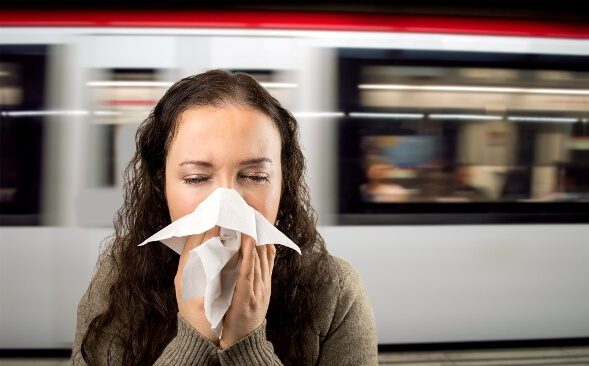
Are Travel Nurses at Higher Risk of Getting Sick?
Nurses spend their working days and nights around sick people, which automatically puts them at greater risk than the general population of getting sick. But what about travel nurses--are they at even greater risk than permanent staff?
The short answer? Yes, at least in theory. But there are simple things you can do to lower your risk, stay healthy and enjoy the unique rewards of travel nursing.
Why is the risk of illness greater? First, because the travel nurses who take public transportation en route to their traveling nurse jobs may catch something before they even start their new assignment! As reported in the Journal of Environmental Health Research, cold and flu germs are more likely to spread in enclosed airplanes, buses and other vehicles with recirculating air.
But even the majority of travel nurses who drive to their new jobs in private cars will have to manage the normal stresses involved with moving, starting a new job and getting used to new cities and living quarters. Change can be a cagey culprit, destabilizing the immune system and leaving you more susceptible.
Most travel nurses love their jobs because the new locations energize and excite them. Every once in a while, however, a location may not “sit well” with a traveler--especially early in the assignment--due to real environmental changes. When weather, altitude, humidity, bacteria levels and allergens differ from what your body is accustomed to, the immune system can take a hit.
Follow these tips for travel nurses, to ensure you tackle your new assignment in top health.
1. Ease into the local foods
That spicy Southern gumbo may be tempting, but it’s a good idea to adapt slowly to the local flavors. Over time your body can adjust to the differences in the food and spices, but in the meantime, unfamiliar foods can upset your digestive tract, resulting in heartburn, cramps, gas, diarrhea or vomiting.
2. Stay well hydrated
Whether it is a long plane flight, an unprecedented heat wave, or a higher-than-normal altitude that you’re adjusting to, drinking plenty of water can keep your body hydrated, staving off dizziness or shortness of breath. It can also help keep your digestive system working as it should. It may be best to stick with bottled water for the first week or so, because your body isn’t used to the bacteria levels in the local water.
3. Maintain a regular exercise regimen
Your overall health is more likely to adapt to environmental changes if a regular exercise regimen is followed. Just 30 minutes of physical activity each day can boost your immune system and help you fight off illness, according to WebMD. Daily exercise also helps you sleep more soundly, which is a great way to overcome any time zone difference challenges you may be facing. It also increases your energy level and can improve your mood, making it easier to power through those long nursing shifts.
4. Prevent bug bites
Mosquitos can run rampant in some parts of the country, especially in hot months and in areas with standing water. They can also transmit debilitating diseases. This year, the Zika virus has hit Puerto Rico and Florida, among other locales, putting citizens and officials on their guard. The bite or sting from bees, spiders, ticks, fleas or cockroaches can also spread viruses or allergic reactions, making you sick. If you have relocated to an area with a large assortment of bugs, limit your chances of getting bitten or stung by using DEET spray, or wearing clothing that covers up your vulnerable, exposed skin.
5. Take it easy on yourself
Adjusting to new surroundings, new work schedules, new commuting routes, etc., can zap your energy those first few days after arriving at a new assignment. If you push your body too far when you first arrive--even for fun activities--you may end up paying for it. So take it easy, get your rest, and once you are acclimated, get ready to step out with your health intact.
What to do when you DO get sick
Don’t call in sick if you’re not, but do call in sick if you are. You don’t want to spread what you have to other nurses or patients. When you aren’t well enough to report for your shift, simply call the hospital. Then let your travel nurse agency know if required in your contract.
American Mobile will pay for any nursing licenses you’ll need in other states and make the whole process simple. FIND your next travel nursing job with one quick search to get the process started!
© 2016. AMN Healthcare, Inc. All Rights Reserved.